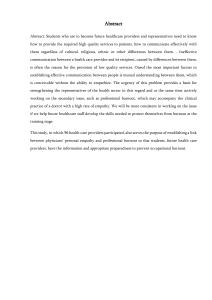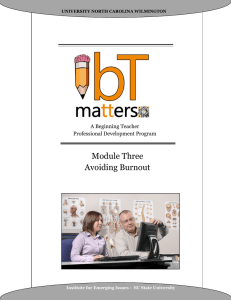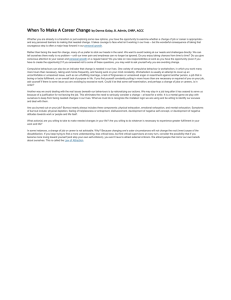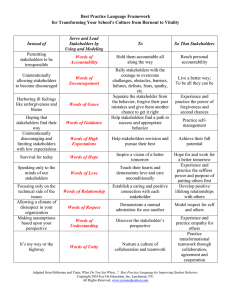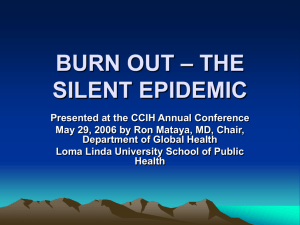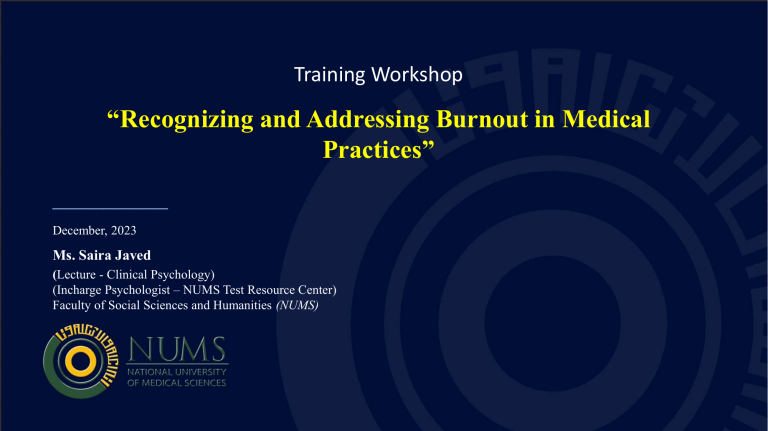
Training Workshop “Recognizing and Addressing Burnout in Medical Practices” _________ December, 2023 Ms. Saira Javed (Lecture - Clinical Psychology) (Incharge Psychologist – NUMS Test Resource Center) Faculty of Social Sciences and Humanities (NUMS) Burnout • What is happening to doctors? • “Life is never made unbearable by circumstances, but only by lack of meaning and purpose.” • Viktor Frankl Burnout… Burnout… Physical, emotional and mental exhaustion caused by long term involvement in emotionally demanding situations Burnout • Role Overload – expectations of others exceed one’s ability to perform • Role Conflict – forced to make a choice about which demand to satisfy • ex) child’s soccer game vs. staying late to see patient or complete paperwork Burnout in Healthcare Definition • 3 Dimensions • Emotional exhaustion • Feeling low personal accomplishment • Depersonalization of the patient Contributing Factors • Professional isolation • Working with a difficult population • Long hours with limited resources • Ambiguous success • Unreciprocated giving • Failure to live up to one’s own expectations • Personality Variables The cost of a burned out doc • Effect on patient care and safety • Patient medication adherence • Physician recommended evidence based screening and health counseling reduced when physicians have poor personal health • Reduced workplace productivity and efficiency • Cost of replacing a physician (150-300 K, maybe 1million) (Wallace, 2009) Burnout • Why is it happening to doctors? To the people who choose to become doctors? Declaration of Geneva of the World Medical Association: (adopted 1948, amended 1966 and 1983) • I solemnly pledge myself to consecrate my life to the service of humanity; • I will give my teachers the respect and gratitude which is their due; • I will practice my profession with conscience and dignity; • The health of my patient will be my first consideration; • I will respect the secrets which are confided in me, even after the patient has died; • I will maintain by all the means in my power, the honor and the noble traditions of the • • • • medical profession; My colleagues will be my brothers; I will not permit considerations of religion, nationality, race, party politics or social standing to intervene between my duty and my patient; I will maintain the utmost respect for human life from its beginning even under threat and I will not use my medical knowledge contrary to the laws of humanity; I make these promises solemnly, freely and upon my honor. (Nedrow 2012) Compassion Fatigue (CF) Definition Contributing Factors • State of exhaustion and dysfunction • Helplessness • Feeling incapable of effecting successful patient outcomes (biologically, psychologically, and socially) as a result of prolonged exposure to secondary trauma or a single intensive event • Confusion • Isolation • Exhaustion • Feeling of being overwhelmed by work CF – PTSD? • Most empathetic most likely to experience CF • No quick fix for traumatized patients • Challenging for the empathetic provider • Participating in the patient’s anguish • Hyperarousal: • disturbed sleep, irritability or outbursts of anger, hypervigilance • Avoidance: • “not wanting to go there again” and the desire to avoid thoughts, feelings, and conversations • Reexperiencing: • intrusive thoughts or dreams, and psychological or physiological Self care – Doctors are miserable at this • Less doctor visits for themselves • Self-prescribe drugs (i.e. will not see a doctor) • Perceived (??) stigma around seeking help or support • Willing to work when sick… and expect the same from colleagues (but not patients) • Denial and avoidance – physician coping strategies • Poor record of mutual support and positive feedback in the field • Protecting the privacy of colleagues • Doctors are self-reliant, individually driven, achievers who are industrious and selfsacrificing (Wallace, 2009) Heading off the rails… Emotional exhaustion Fatigue, insomnia, impaired concentration, somatic symptoms, repeated illness, loss of appetite, anxiety, depression, anger Feeling low personal accomplishment Loss of enjoyment, pessimism, sarcasm (in excess), isolation, detachment Depersonalization of the patient Apathy, irritability (with staff, trainees, patients), lack of productivity When it’s more? • 2 weeks or more of persistently diminished mood, loss of motivation, feelings • • • • • • of guilt or worthlessness Persistent social isolation, changes in relationships Life interfering anxiety symptoms Use of alcohol, non-prescribed medications, illicit substances Sustained decline in function Changes in eating patterns or weight loss/gain Suicidal thoughts or self-harming behaviors Conclusion • Burnout and CF exist and they are damaging, and therefore we should be well. • Has anyone ever taught you how to be well? • At work • In marriage • In balanced nutrition • In life… • Who taught you? How did they teach you? • The impact of modeling Awareness Being well 10 commandments of physician wellness Thou shall not expect someone else to reduce your stress. II. Though shall not resist change. III. Thou shall not take thyself in vain. IV. Remember what is holy to thee. V. Honor thy limits. VI. Thou shall not work alone. VII. Thou shall not kill or take it out on others. VIII.Thou shall not work harder. Thou shall work smarter. IX. Seek to find joy and mastery in thy work. X. Thou shall continue to learn. I. (Krall 2014)
